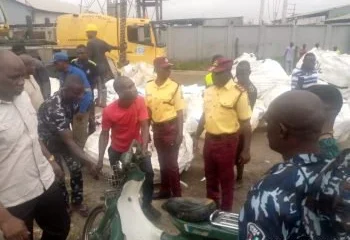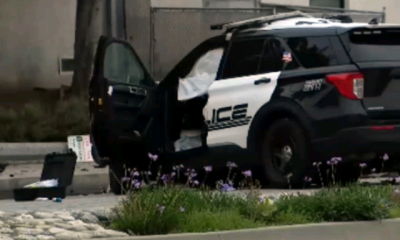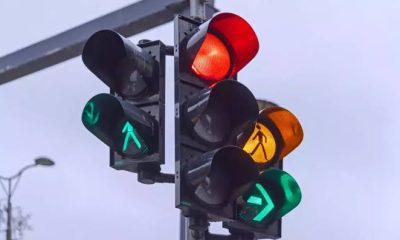Articles
Stay Safe on Nigerian Roads: 12 Smart Security Tips for Every Traveller

Whether you’re heading from Lagos to Kano, Port Harcourt to Abuja or just navigating inter-state business or leisure travel, Nigeria’s roads present more than potholes and bad signage.
Also Read: 10 Things You Should Never Do When Your Car Breaks Down on the Road
They pose real security threats from armed robbery to roadside banditry, carjacking, and kidnapping.
Learning how to drive is only half the job; staying safe is the rest. This guide lays out 12 essential security and travel-safety measures every motorist should know.
12 Concrete Security Tips for Road Travellers
- Plan your route and travel during daylight if possible
Research your route ahead of time, know the bad stretches, avoid high-risk zones. Many security advisories advise against travel after dark in unfamiliar areas.
Choose departure times so you arrive before darkness. - Ensure your vehicle is road-worthy & loaded with emergency gear
A breakdown in the bush or on an isolated highway exposes you to more risk. Carry essentials: spare tyre, jack, torch, water, phone charger, power bank.
Leave nothing to chance. - Secure your valuables, keep doors locked, windows up, and items hidden
Highway crime often starts when the vehicle is vulnerable: doors open, windows down, valuables visible. Canadian & UK travel advice both emphasise this.
Don’t draw attention to yourself. - Avoid unfamiliar drivers or unverified transport companies if you’re not driving yourself
If you’re using a driver or bus service, ensure credentials, operating company, condition of vehicle are clear. Many travel-security guides say unregulated transport = higher risk. - Stay aware and trust your instincts
If something feels off, a deserted junction, unknown vehicle tailing you, odd behaviour at a checkpoint, leave. Situational awareness is one of the best defences. - Avoid stopping at isolated spots – especially after dark
A flat tyre? Breakdowns? If you must stop, choose a lit, populated place or call for help. Official travel advice warns about forced stops turning into carjackings or kidnappings. - Keep emergency contacts and local helplines at hand
Pre-store numbers: FRSC, police, local state emergency services, nearby hospital. Also share your travel plan with someone else. - Avoid predictable patterns if you’re on a long-haul or inter-state trip
Travelling alone on long routes at night, with no stops, uses fatigue and gives criminals opportunity. Break your journey, stop when you can, rest. - Understand the security climate of the region you’re travelling through
Some states have high kidnapping, banditry, or militant threats. Foreign travel advisories detail these risks for Nigeria.
Avoid or adjust travel through such zones. - Be extra cautious at checkpoints — official or unofficial
There are authorised checkpoints, but also illegal ones. At both, keep documents ready, remain calm, don’t hand over original IDs if you feel pressured, follow official protocol. - Secure digital & physical copies of your documents
Keep a scan/photo of your licence, registration, insurance, and personal ID in the cloud or WhatsApp. If your bag is stolen, you’ll still have access. Also keeps you prepared for fake-document tricks. - Minimise risk of distraction — no loud gadgets, no showy behaviour, no ignoring surroundings
Driving demands attention. Showy jewellery, phones out, overly relaxed posture even when you’re tired or in unsafe terrain invites trouble. Stay alert.
Why These Measures Matter: The Bigger Picture
Nigeria’s road security environment is complex. It isn’t just bad roads, it’s bad roads plus bad actors. The combination means a simple journey becomes a potential hazard.
For example, travellers have been ambushed at night on major highways, vehicles hijacked, or stopped at fake roadblocks and robbed.
And when a vehicle breaks down on a lonely stretch, what starts as a mechanical problem can turn into a security threat.
One example: A business consultant driving from Abuja to Kaduna late one evening stopped for fuel, noticed a strange vehicle following them. Instead of ignoring, they diverted to a police station, which later found the other vehicle had attempted to stage a fake breakdown ahead, a known bandit tactic. Their awareness saved them.
Another: An interstate traveller who travelled beyond midnight on an isolated highway with no rest stop was attacked after tyre burst. Because he had planned stops and logged his route, he alerted local contacts and survived with minimal harm.
These are not dramatic contrivances — they are proof that planning, vigilance, and awareness make the difference.
RoadKing’s Quick Checklist Before You Hit the Road
- Vehicle serviced (brakes, tyres, lights) & emergency kit ready.
- Travel route marked and shared with a trusted contact.
- Departure time planned for daylight if possible.
- Valuables hidden, doors locked, windows up.
- Phone fully charged, power bank ready, contacts saved.
- Sleep and rest before long drive.
- Travelling company verified if using transport service.
- Avoid night driving on high-risk highways.
- Keep digital copies of documents.
- Stay alert; if anything feels unsafe, reroute or stop.
























